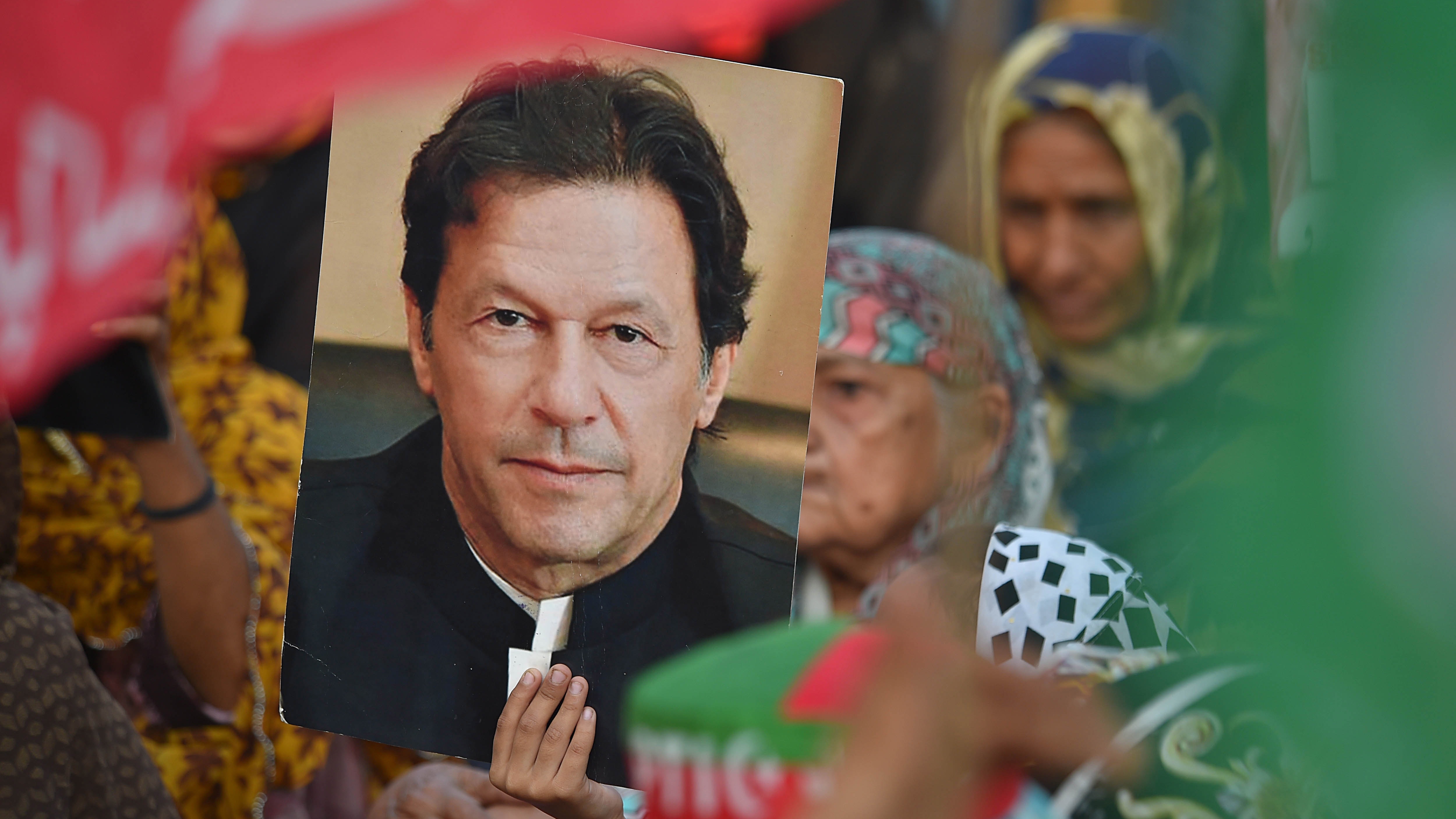Imran Khan takes on the army in Pakistan
The former Pakistani PM has decried ‘a corrupt system’ that ties the military to political parties

A free daily email with the biggest news stories of the day – and the best features from TheWeek.com
You are now subscribed
Your newsletter sign-up was successful
He was once an international cricketer, then a politician, then Pakistan’s prime minister. Now, after being deposed as PM by a no-confidence motion last year, Imran Khan is emerging as the leader of a “grassroots political revolution” in his home country, said Azeem Ibrahim in Foreign Policy (Washington).
His target is what he calls a corrupt system tying the Pakistani military and mainstream political parties together – and he has been making a remarkable stir. Khan has led supporters in mass marches and rallies; he has been shot and wounded; and his allies say they’ve been tortured in police custody.
Things came to a head on 14 March, when Khan was due to be arrested on what his supporters say are “trumped-up” terrorism and corruption charges.
The Week
Escape your echo chamber. Get the facts behind the news, plus analysis from multiple perspectives.

Sign up for The Week's Free Newsletters
From our morning news briefing to a weekly Good News Newsletter, get the best of The Week delivered directly to your inbox.
From our morning news briefing to a weekly Good News Newsletter, get the best of The Week delivered directly to your inbox.
Crowds of his supporters gathered outside his home in Lahore, successfully preventing his arrest by police who used tear gas and water cannon to try to clear them.
‘Khan the messiah’
As a result, Khan “remains free” – and is still riding an extraordinary wave of popularity that would likely put his PTI party on course to win an “overwhelming majority” in elections due this year. What explains Khan’s phenomenal popularity?
Partly, it’s down to the increasing prominence of a new lower middle class of doctors, lawyers, traders and activists – people who’ve long been ignored by Pakistan’s “traditional ruling elite”, said Syed Akhtar Ali Shah in The Express Tribune (Karachi).
In a country scarred by deep inequalities, Khan presents himself as a kind of “messiah” who will end the iniquity of people’s life chances being determined at birth. His goal is a total overhaul of a system in which the military governs Pakistan alongside chosen cooperative politicians, said Uzair M. Younus in Dawn (Karachi).
A free daily email with the biggest news stories of the day – and the best features from TheWeek.com
That has made him extremely popular with the under-30s, who make up some 60% of Pakistan’s population; but it has also set him up for a bruising fight with the country’s “most powerful institution”, the army.
‘Upheaval is around the corner’
“Upheaval is around the corner.” Khan is no saviour, said Harsha Kakar in Firstpost (Mumbai). It was he, let’s remember, who benefitted during his four-year term as PM from the very system he now calls rotten.
And it was he who recently incited a mob to use force to prevent police from arresting him, thereby sending a message that he is “above the laws of the state” and further imperilling Pakistan’s desperately fragile political settlement.
Khan is an Islamic populist with a cult following and he’s playing a dangerous game, agreed Raza Rumi in The Friday Times (Lahore).
He risks fatally undermining the organs of the state by being selective about which court summons he chooses to obey in the dozens of cases filed against him. And he has set a precedent of resistance to constituted authority that will come back to haunt him in the event he returns to power this year.
After all, if his supporters can be mobilised to such effect to fuel a crisis in Pakistan’s state, what’s to stop his rivals using the selfsame tactics to topple him?
-
 Switzerland could vote to cap its population
Switzerland could vote to cap its populationUnder the Radar Swiss People’s Party proposes referendum on radical anti-immigration measure to limit residents to 10 million
-
 Political cartoons for February 15
Political cartoons for February 15Cartoons Sunday's political cartoons include political ventriloquism, Europe in the middle, and more
-
 The broken water companies failing England and Wales
The broken water companies failing England and WalesExplainer With rising bills, deteriorating river health and a lack of investment, regulators face an uphill battle to stabilise the industry
-
 Democrats push for ICE accountability
Democrats push for ICE accountabilityFeature U.S. citizens shot and violently detained by immigration agents testify at Capitol Hill hearing
-
 Fulton County: A dress rehearsal for election theft?
Fulton County: A dress rehearsal for election theft?Feature Director of National Intelligence Tulsi Gabbard is Trump's de facto ‘voter fraud’ czar
-
 ‘Melania’: A film about nothing
‘Melania’: A film about nothingFeature Not telling all
-
 Greenland: The lasting damage of Trump’s tantrum
Greenland: The lasting damage of Trump’s tantrumFeature His desire for Greenland has seemingly faded away
-
 Minneapolis: The power of a boy’s photo
Minneapolis: The power of a boy’s photoFeature An image of Liam Conejo Ramos being detained lit up social media
-
 The price of forgiveness
The price of forgivenessFeature Trump’s unprecedented use of pardons has turned clemency into a big business.
-
 Reforming the House of Lords
Reforming the House of LordsThe Explainer Keir Starmer’s government regards reform of the House of Lords as ‘long overdue and essential’
-
 The ‘mad king’: has Trump finally lost it?
The ‘mad king’: has Trump finally lost it?Talking Point Rambling speeches, wind turbine obsession, and an ‘unhinged’ letter to Norway’s prime minister have caused concern whether the rest of his term is ‘sustainable’